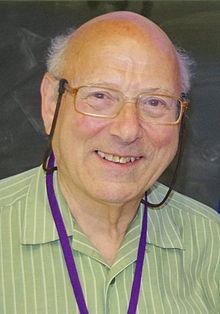Peter M. Neumann | |
|---|---|
 Peter Neumann, 2013 | |
| Born | Peter Michael Neumann 28 December 1940 |
| Died | 18 December 2020 (aged 79) Oxford, England |
| Nationality | British |
| Alma mater | The Queen's College, Oxford |
| Known for | Solving Alhazen's problem (1997) |
| Awards | Senior Whitehead Prize (2003) David Crighton Medal (2012) |
| Scientific career | |
| Fields | Algebra and history of algebra |
| Institutions | University of Oxford |
| Doctoral advisor | Graham Higman |
| Doctoral students |
|
| Website | www.maths.ox.ac.uk |
Peter Michael Neumann OBE (28 December 1940 – 18 December 2020) was a British mathematician. He was a son of the German-born mathematicians Bernhard Neumann and Hanna Neumann and, after gaining a BA degree from The Queen's College, Oxford in 1963, obtained his DPhil degree from Oxford University in 1966.
Neumann was a Tutorial Fellow at the Queen's College, Oxford, and a lecturer at Oxford University.[2] After retiring in 2008, he became an Emeritus Fellow at the Queen's College. His work has been in the field of group theory. He is also known for solving Alhazen's problem in 1997.[3] Neumann's work in the history of mathematics includes his 2011 edited edition of the work of the short-lived French mathematician Évariste Galois (1811–1832).[4] Neumann was a long-standing supporter of the British Society for the History of Mathematics, whose Neumann Prize is named in his honour.[5]
In 1987, Neumann won the Lester R. Ford Award of the Mathematical Association of America for his review of Harold Edwards' book Galois Theory.[6][7] In 2003, the London Mathematical Society awarded him the Senior Whitehead Prize.[8] He was the first Chairman of the United Kingdom Mathematics Trust, from October 1996 to April 2004, succeeded by Bernard Silverman.[9] He was appointed Officer of the Order of the British Empire (OBE) in the 2008 New Year Honours.[10]
Neumann died on 18 December 2020 of COVID-19.[11][12][13]
References
- ^ "Dr Peter M Neumann, O.B.E." The Queen's College, Oxford. Retrieved 26 June 2009.
- ^ Blackburn, Simon R.; Neumann, Peter M.; Venkataraman, Geetha (18 October 2007). Enumeration of Finite Groups (Cambridge Tracts in Mathematics) — About the Author. ISBN 978-0521882170.
- ^ Highfield, Roger (1 April 1997). "Don solves the last puzzle left by ancient Greeks". Electronic Telegraph. 676. Retrieved 19 November 2012.
- ^ Neumann, Peter M. (2011). The Mathematical Writings of Evariste Galois. Heritage of European Mathematics. European Mathematical Society. ISBN 978-3037191040.
- ^ "Neumann Prize". UK: British Society for the History of Mathematics. Retrieved 18 December 2020.
- ^ The Lester R. Ford Award, MAA, retrieved 2010-02-01.
- ^ "Book Review of Galois Theory by Harold M. Edwards". Amer. Math. Monthly. 93: 407–411. 1986. doi:10.2307/2323619. JSTOR 2323619.
- ^ "List of Prizewinners". London Mathematical Society. Retrieved 8 July 2007.
- ^ The UK Mathematics Trust Yearbook 2003–2004. United Kingdom Mathematics Trust. 2004. ISBN 0953682358.
- ^ "Officers of the Order of the British Empire" (PDF). BBC News. UK: BBC. p. 32. Retrieved 27 January 2010.
- ^ "Dr Peter Neumann (1940 – 2020)". News. London Mathematical Society. 21 December 2020. Retrieved 31 December 2020.
- ^ Neumann, David (4 January 2021). "Peter Neumann obituary". The Guardian. Retrieved 11 January 2021.
- ^ Cameron, Peter (18 December 2020). "Peter Neumann". Peter Cameron's blog. Retrieved 22 December 2020.
External links
- Home page at the Mathematical Institute, Oxford
- Home page at the The Queen's College, Oxford
- Peter M. Neumann at the Mathematics Genealogy Project